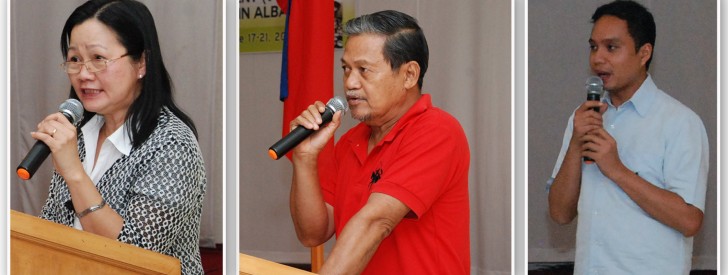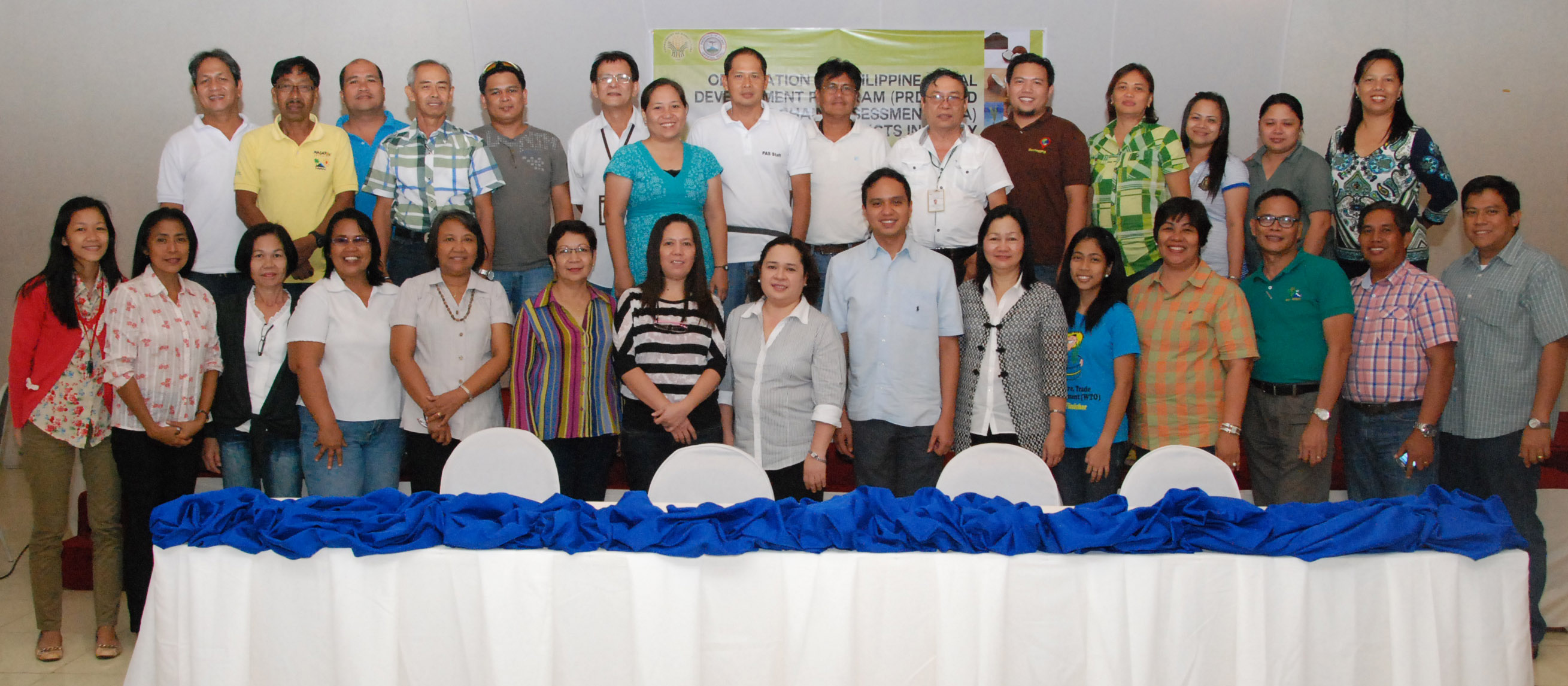 (Left to right) Dr. Elena B. delos Santos, DA 5 RTD for Operations and Extension and focal person of PRDP in Bicol; Ruben Limos, APCO for Albay; and Shandy Hubilla, PRDP Luzon B Program Coordinator.
(Left to right) Dr. Elena B. delos Santos, DA 5 RTD for Operations and Extension and focal person of PRDP in Bicol; Ruben Limos, APCO for Albay; and Shandy Hubilla, PRDP Luzon B Program Coordinator. NPCO holds PRDP orientation in Albay
by Lovella P. Guarin
LEGAZPI CITY — The national implementation team of the P27.535 billion Word Bank funded project PRDP was here for a five-day “Orientation on Philippine Rural Development Program (PRDP) and Value Chain Assessment of Coconut Products in Albay.” This was held at Alicia Hotel on June 17-21, 2013. Albay province is the second among the 80 target provinces in the country to benefit from the PRDP.
The Philippine Rural Development Program (PRDP) is a World Bank assisted program to be implemented by the Department of Agriculture (DA) in 16 regions of the country from 2013 to 2019. It is a national government platform for a modern and climate-smart agriculture that will involve 80 Provincial Local Government Units (PLGUs) and agri-fishery stakeholders in realizing the goals of improved food security and increased incomes, climate resiliency and enhanced policy environment and governance.
Dr. Elena B. delos Santos, DA 5 RTD for Operations and Extension and focal person of PRDP in Bicol said that in the region, Albay was chosen as the pilot province, with coconut as the priority commodity. She said the five day seminar workshop was aimed to officially orient the program implementation unit of Albay on the details of the PRDP and to conduct an indepth Value Chain Assessment (VCA) of priority coconut products especially coco coir and virgin coconut oil. This VCA will be the basis in the preparation of the Provincial Commodity Investment Plans which will give birth to sub-projects for possible funding under the project.
Ruben Limos, Agricultural Program Coordinating Officer (APCO) for Albay, said the project will have a big impact to the coconut industry of Albay considering that 40,200 hectares of the total 103,774 hectares agricultural land in Albay is planted to coconut. The development of enterprises on coco coir and virgin coconut oil will create more jobs and added income for the coconut farmers whose majority rely only on copra trading.
Shandy Hubilla, PRDP Luzon B Program Coordinator, discussed the rationale, program costs and equity sharing and implementations arrangement of the PRDP. He said the target provinces were ranked for prioritization through spatial multi-criteria analysis of climate, land suitability and crop type using GIS. Project monitoring will also be carried out through geo-tagging and mapping.
Hubilla said the PRDP has 4 components which are 1) I-PLAN or Investments in AFMP Planning at the Local and National Levels; 2) I-BUILD or Intensified Building up of Infrastructure and Logistics for Development; 3) I-REAP or Investments in Rural Enterprises and Agriculture and Fisheries Productivity; and 4) I-SUPPORT or Implementation Support to PRDP.
The total project cost for PRDP is P27.535 billion consisting of P20.553 billion loan from the World Bank; P3.579 billion as national government counterpart; P3.118 billion equity of the local government units, and P287-million grant from the Global Environment Facility (GEF). I-Build component gets the biggest share which is 67.40% of the total project cost; I-Plan 2.90%; I-Reap 25.20%; and I-Support 4.50%. Fund allocation for approved Provincial Commodity Investment Plans will be on a first come first serve basis and will be released directly to the province.
The PRDP is also being implemented in convergence with other government initiatives: the National Convergence Initiative for synchronized delivery of programs and services to the rural communities and harmonization of priority areas to eliminate duplication and maximize complementation of activities; the DPWH for technical support in the design of FMR/bridges and coordination to complement with the national road network plan; DOST to provide access to research activities and transfer of developed technologies related to agriculture products and processes; DTI for enterprise development; DSWD as support to Conditional Cash Transfer Program; and DBM, DILG, DSWD and NAPC for a more participatory planning and budgeting through involvement of grassroots organizations and communities.
The PRDP team is composed of National Program Advisory Board headed by Agriculture Secretary Proceso J. Alcala; the National Program Coordination Office headed by Joel S. Rudinas, DA Undersecretary for Field Operations; the Regional Policy Advisory Board headed by DA 5 Regional Executive Director Abelardo R. Bragas; the Program Support Office which will be established in each regional cluster in Luzon, Visayas and Mindanao; the Regional Program Coordinating Offices; Provincial Program Management & Implementing Units and the Municipal Local Government Units, POs, NGOs.
Meanwhile, Ms. Nieva Natural, Alternate I-PLAN component national head discussed the I-PLAN component; Mr. Allan Tattiera, Luzon B Rural Infrastructure engineer discussed the I-BUILD Component; Ms. Leny Pecson, Alternate I-REAP Component head discussed the I-REAP component and VCA Consultant Jonah Nobleza discussed the Assessment of Existing Agri-Fishery Value Chain on Coco Coir.
Also present during the orientation workshop were DA RFU 5 division chiefs/ component heads: Ernesto Parato, for I-PLAN; Engr. Arnie Ilan for I-BUILD; and Adelina Losa for I-REAP. PCA Regional Director Eduardo Allorde; BSWM SWAT Coordinator Celso Bersabe; Albay Agricultural Programs Coordinating Officer Ruben Limos; Engr. Macario Pavia, Albay Provincial Planning Development Officer; officials of Albay Planning and Engineering Offices; and NGOs.
The group also visited coco coir processing plants of SAIS BC cooperative such as CADECO at San Rafael, Castilla, Sorsogon, and coco coir exporter JUBOKEN enterprises in Camalig, Albay. They also interviewed coconut farmers and suppliers of coconut husk and virgin coconut oil.


